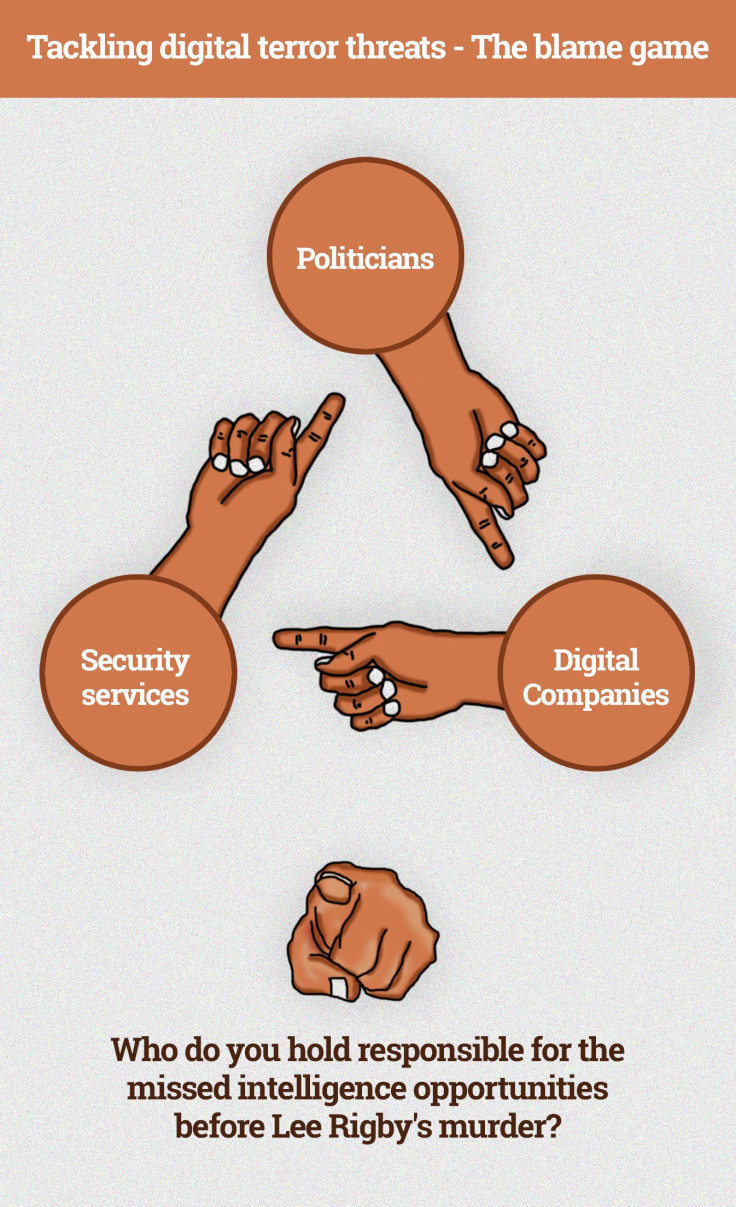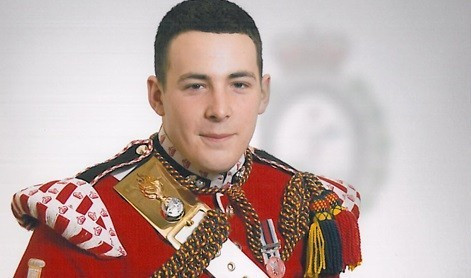Lee Rigby Report: Who do You Hold Responsible in the Counter-Terrorism Blame Game? [POLL]

There's a triangular blame game going on over who is responsible for what when it comes to fighting terrorism.
It's encapsulated in a report by parliament's Intelligence and Security Committee (ISC) into Fusilier Lee Rigby's murder.
Rigby was almost decapitated in a broad daylight attack by two radicalised Muslims, Michael Adebolajo and Michael Adebowale, as he walked the streets of Woolwich.
Both men were known to the security services and MI5 had conducted several investigations, but concluded they were not significant threats.
The report by MPs accused MI5 of making a number of errors, though it said the intelligence agency could not have stopped the murder. Adebolajo and Adebowale are both serving life in prison.
It isn't just MI5 who has come under fire over anti-terrorism. Others are facing criticism too.
Theresa May, home secretary, has now unveiled a raft of yet more counter-terrorism measures on top of previous legislation which privacy campaigners dubbed a "snooper's charter".
So who is holding who responsible in the anti-terror blame game?
Security services
The security services, like MI5 and GCHQ, blame the government for not giving them enough resources and powers to tackle the terror threat, and internet companies for not trawling their own data and feeding them information.
A Times report from April 2013 said MI5 and MI6 chiefs had been putting pressure on Chancellor George Osborne to give them more money, else he would put national security at risk. They were handed a 3% increase in their budgets that year.
Parliament's Intelligence and Security Committee (ISC) report into Lee Rigby's murder and the role of MI5 noted the agency had "limited resources, and must continuously prioritise its investigations in order to allocate those resources".
And MPs said they "recognise the pressures" on MI5 funding which mean lower priority work is shelved when an urgent issue of higher priority arises.
Politicians
Politicians blame the security services for not being diligent enough with the resources they have and the internet companies for not doing enough themselves to scout for terrorist or extremist activity which can be reported to the authorities.
The ISC report said there was an exchange on a social network, thought to be Facebook, in which Adebowale told an overseas friend he intended to kill a soldier.
MPs said the firm "does not appear to regard itself as under any obligation to ensure that its systems identify such exchanges, or to take action or notify the authorities when its communications services appear to be used by terrorists".
Of MI5, the Committee said the intelligence services had made "a number of errors" in its investigations of Rigby's two murderers, but ultimately they could not have prevented the incident.
Internet companies

The internet companies, such as social networks, say they don't have the resources to trawl masses of data and can only act on activity that is flagged to them. Plus, they are in a difficult position because of user privacy and data protection law. And, they add, it's not their responsibility to do the security services' job for them.
Responding to the accusation that Facebook was used by one of Rigby's killers, it said: "We don't comment on individual cases but Facebook's policies are clear, we do not allow terrorist content on the site and take steps to prevent people from using our service for these purposes."
Jimmy Wales, the founder of Wikipedia, told The Independent: "Given that 'Adebowale was not under active investigation at the time the exchange took place' the suggestion is clearly not that such techniques be used in a highly targeted way but rather that we demand that corporations used advanced technology to spy on all of us all the time.
"Remarkable, to say the least. And by 'remarkable' I mean the East German Stasi would have wet themselves with excitement if they had such techniques at their disposal."
Google had told MPs that due to the scale of information it has oversight of, to manually review even a small percentage would be "impossible". Twitter described such trawling as "unfeasible". While Yahoo said it "does not proactively monitor communications on Yahoo Mail or Yahoo Messenger. That would breach our users' privacy."
© Copyright IBTimes 2025. All rights reserved.




















